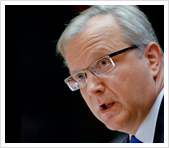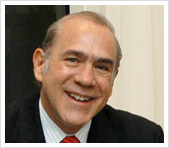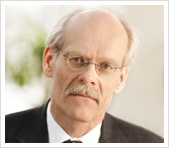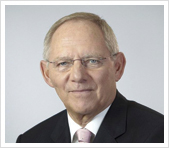 |
| |
 |
|
 |
 |

|

|
High-level debates mark 12th Forum as Europe moves towards ‘real economic union’
The 12th Brussels Economic Forum took place on 18 May. This is a pivotal moment as Europe enters a decade of fundamental reform on its way to creating what Commissioner Olli Rehn has called “real and functional economic union”. At this year’s Forum, Wolfgang Schäuble, Federal Minister of Finance and member of the German Bundestag, gave the First Annual Padoa-Schioppa Lecture, and other prominent leaders such Angel Gurría, Secretary-General, OECD, and Stefan Ingves, Governor of Sveriges Riksbank, Sweden, also shared their views. Lively debates were held during the three roundtable sessions on strengthening the surveillance of fiscal and macroeconomic imbalances, ensuring the robustness of the economic governance framework and the key lessons learned from the economic crisis.
|

|
 |
  José Manuel Durão Barroso José Manuel Durão Barroso
President of the European Commission |
 |
 |
 |
« Reforms that we would have thought impossible are a reality now because Member States have realized that we are inter-dependent. » |
 |
 |
|
 |
 |
  Olli Rehn Olli Rehn
Commissioner for Economic
and Monetary Affairs |
 |
 |
 |
« I trust that we’ll have the wisdom and political will to take the necessary decisions. » |
 |
 |
|
 |
 |
  Sharon Bowles Sharon Bowles
Member of European Parliament, Chair of the Economic and Monetary Affairs Committee |
 |
 |
 |
« Once you get rules, the markets will game the rules. It has to come down to greater transparency. » |
 |
 |
|
 |
 |
  Angel Gurría Angel Gurría
Secretary-General of the OECD. Paris, France |
 |
 |
 |
« We ran out of money on the fiscal side and room on the monetary side. What is left? We have structural reforms. » |
 |
 |
|
 |
 |
  Stefan Ingves Stefan Ingves
Governor of Sveriges Riksbank, Sweden’s central bank |
 |
 |
 |
« If in debt you are not free. »
(Quoting the former Swedish Prime Minister Göran Persson) |
 |
 |
|
 |
 |
  Wolfgang Schäuble Wolfgang Schäuble
Federal Minister of Finance and member of the German Bundestag |
 |
 |
 |
« Reducing the deficit burden does not stifle growth, it nurses sustainable growth. » |
 |
 |
|
 |
 |
 |
|
|
 |
 |
 |
 |
 |
Europe “putting on its clothes again”
Olli Rehn, European Commissioner for Economic and Monetary Affairs opened the Forum with the message that Europe’s recovery continues to gain momentum. The recovery is also becoming more broad-based as it’s increasingly driven by domestic demand rather than exports. It’s a 2-speed recovery, however, with some Member States rebounding while others are still struggling. Nonetheless, the time is ripe for enhancing economic coordination. Now Europe must decisively implement what has been agreed, said José Manuel Barroso, President of the European Commission. |
 |
|
 |
 |
 |
|
 |
 |
 |
 |
 |
 |
An avowed euro-phile spurs Europe to action
Delivering a keynote address at the Forum, Angel Gurría, Secretary-General of the Organisation for Economic Co-operation and Development (OECD), urged Europe to fix its persistent unemployment problem and tackle its sovereign debt crisis. He said that if nothing was done, the pace of growth in the euro area over the next 15 years would be about half of what it has been since 1995. Gurría said he was concerned about Europe’s unemployment problem as well as the continent’s growing mountain of debt. He advocated environmental taxes and structural reforms as one possible way forward. At the same time Gurría also welcomed euro area efforts to strengthen EU institutions, by which it is turning a crisis into an opportunity. |
 |
|
 |
 |
 |
|
 |
 |
 |
 |
 |
 |
Schäuble delivers ‘tough love’
Delivering the first Annual Tommaso Padoa-Schioppa Lecture, Germany’s Federal Minister of Finance, Wolfgang Schäuble, said that the sovereign debt crisis was a fiscal crisis rather than a currency crisis. He gently chastised Member States for living beyond their means, pleaded for structural reforms, while recognising the vital role that economic coordination has to play.
|
 |
|
 |
 |
 |
|
 |
 |
 |
 |
 |
 |
Better European governance
How will the European Union govern its economy over the next few years?
This was the topic of debate during the first session of the Brussels Economic Forum.
Representatives of the European Commission, European Central Bank and European Financial Stability Facility set out their vision, based on better management of budgets when economic times are good, and tougher sanctions for those who broke the rules.
But panelists, including an academic and a banker, warned policy-makers against thinking they knew better than the markets.
Debt restructuring and the continuing ‘too-big-too-fail’ banking issue were also touched upon as part of a wide-ranging discussion.
|
 |
|
 |
 |
 |
|
 |
 |
 |
 |
 |
 |
The EU economic governance framework in practice: “the devil is in the detail”
Participants in Session II of the Forum felt that the EU needs to increase transparency and engagement at the national level in order to ensure that reforms to economic governance are successfully implemented. They asserted that markets could play a role in ensuring fiscal discipline, but believed that supervision and regulation should secure better market discipline. The roundtable participants also felt that structural reforms should be much more specific depending upon the country. |
 |
|
 |
 |
 |
|
 |
 |
 |
 |
 |
 |
If in debt you are not free
Stefan Ingves, governor of Sweden’s central bank, used the quote “If in debt you are not free” to open his keynote speech at the Brussels Economic Forum.
While hit hard by the financial crisis, Sweden was able to bounce back surprisingly well thanks to a large extent to its low debt levels.
The state’s strong debt position, the result of several years of budget surpluses, meant it did not have to impose the draconian cuts seen in other countries.
The country’s strong export industry helped stabilise the economy when world trade recovered. “If you look at the bounce-back you will see it has been remarkable,” said the governor.
That said, the crisis did highlight weaknesses in Sweden’s banking system.
|
 |
|
 |
 |
 |
|
 |
 |
 |
 |
 |
 |
Testing the limits of economic reform
The final debate of the Brussels Economic Forum focused on the human factor – the citizens who will ultimately be affected by the proposed economic governance package.
Panelists reminded the Forum of the human toll of the crisis, which has left many in fear of losing jobs, houses and pensions.
There was also debate regarding the will to implement the proposed economic governance package. Are euro-area Member States ready for more integration? Are citizens willing to see greater powers concentrated in the hands of the European Commission?
|
 |
|
 |
 |
 |
|
 |
 |
 |
|
 |
 |
Directorate-General for Economic and Financial Affairs |
|
|
|
 |
|